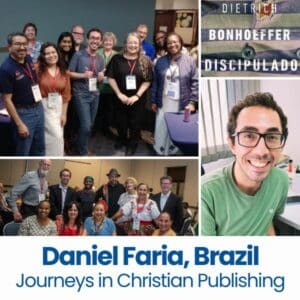“I’m dreaming that the books of our Brazilian authors will be read all over the world,” Daniel Faria says. “We live in a time where this kind of dream could be possible. May we never forget the sense of our mission of transforming lives through this beautiful ministry of Christian literature!” Daniel is Editorial Manager of Mundo Cristão, a large Christian publishing house in Brazil. In 2011, he coordinated the production of the Bible translation Nova Versão Transformadora (NVT). He has since been involved in editing commentaries, translations and titles written by Brazilian authors. This story is part of the Journeys in Christian Publishing: Stories from LittWorld series.
How did the Lord lead you into your current publishing ministry?
When I started university, I had been distant from the church, from faith, from God. I was studying social communication—it’s what we call journalism in Brazil. As soon as I began to dedicate myself to learning more about God and the Christian faith through literature, God made it possible for me to work on that. I had just read Anna Karenina, by Leo Tolstoy, and experienced in my own life the transforming power of literature. Then, I started translating and writing some texts on spirituality on a personal blog. This attracted the attention of a journalist who had just been hired by Mundo Cristão as an editor. When he needed to form an editorial team, he called me to be part of Mundo Cristão, where I am to this day. The Lord has worked in a very timely manner throughout my life. God’s timing has been perfect in my life in so many ways.
 What are some of your favorite books? (And why?)
What are some of your favorite books? (And why?)
I’ve discovered how literature can change a life. At least three books have changed mine.
Anna Karenina by Leo Tolstoy, the legendary Russian writer—the greatest ever, in my opinion. I remember reading it night after night at the library of my university during my graduate years. Tolstoy showed me through the narrative of his two main characters, Anna and Lievin, the emptiness inherent to any worldview that excludes Jesus and his preaching of love and grace. That was a really life-transforming message in my youth years.
The Cost of Discipleship (only Discipleship, or Discipulado, in Portuguese) by Dietrich Bonhoeffer, the German theologian who was involved in a plot to overthrow Adolf Hitler. When I started working at Mundo Cristão, this was one of the first books I edited. Never in my life had the words of Jesus in the Sermon of Mount touched my soul in such a way, reconciling the connection between faith (what I believe) and obedience (what I do).
Grande Sertão: Veredas (published in English as The Devil to Pay in the Backlands) by João Guimarães Rosa, a kind of Brazilian James Joyce who is, I believe, a treasure to be found by readers outside Brazil. It tells the story of Riobaldo, a bandit living in a poor and isolated rural area who found himself overwhelmed by questions about good and evil, God and the devil. Maybe this is, in fact, what happens when you are deprived of the comforts and distractions of modern life! Having family ancestors who came from that same area, the book resonated with me in a very unique way.
How do spiritual disciplines play a part in your publishing routine?
My main spiritual discipline in my publishing routine is to respect the Sabbath, or a day of personal rest and contemplation. Yes, I’m constantly blessed by most of the books I’ve edited, but it’s not the same as reserving a time to connect with God and his Word. In this sense, the “kenosis hymn” in Philippians 2.5-8 has been a precious reminder of my need to follow Jesus. I must totally surrender myself to God in order to be filled with his Spirit, and that I won’t do in the midst of the daily professional rush.
What are your top 3 tips for someone looking to become an editor and work with authors?
Read widely. You need to get yourself acquainted with different kinds of books to be successful in this field. This will give you a sense of the contrast between renowned authors (the “classic”) and others. You’ll develop a sense of what is a well-built book—and a not-so-good one.
Write and compare. You can start by simply reproducing excerpts of a book written by an author famous for their writing style. Then you can write your own texts and compare rhythm, vocabulary, choice of themes and subjects. This will give you some idea of the technical knowledge and erudition involved in writing a book.
Edit and pause. Once you have written a text, distance yourself from it for a while and then read it again as a
“real reader” would. Immerse yourself in the text. You will certainly notice elements to adjust and correct, and you will start to understand the necessity of an edit in order to improve the original.
If you get joy doing these three things, maybe you’re on your way to doing this job successfully! You’ll understand what it is to be an author. It’s a lesson on humility, which is, I believe, the most necessary quality for editors.
In what ways have you been blessed by LittWorld?
I’m a very introverted and shy person and I really appreciate my time alone in my office in front of a computer screen and with text! But when you’re in a place like this with people like this, it’s especially encouraging. It’s inspiring to know other people from each part of the world and get to know their work—and get to know how they also love the Word of God. And you’re comfortable knowing that God is working in each part of the world through talented and gifted people to promote His Kingdom through the special mission that is Christian literature.
How might we pray for you?
Pray for all evangelical Brazilian churches. Although the Brazilian church is flourishing and thriving, its rapid growth has also resulted in syncretism with other religious (and non-religious) expressions of our country, leading to deep fragmentation and political polarization. The church is being courted by the powers-that-be, and this proximity to human grandiosity and power is a constant threat to our relationship with a God who revealed Himself in a humble manger in a neglected and oppressed area two millennia ago.
Pray for the ministry of Mundo Cristão and for me as I edit. I want to engage readers in countries where reading is not a habit, and see lives transformed through Christian literature—I want do that for all my life. And I’m dreaming that the books of our Brazilian authors will be read all over the world. They are very talented, gifted authors. We live in a time where this kind of dream could be possible. May we never forget the sense of our mission of transforming lives through this beautiful ministry of Christian literature!

